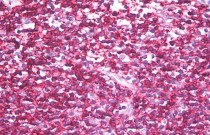ARG62866
anti-CD45RB antibody [MEM-143]
anti-CD45RB antibody [MEM-143] for Flow cytometry,IHC-Formalin-fixed paraffin-embedded sections and Human
Developmental Biology antibody; Immune System antibody; Neuroscience antibody; Signaling Transduction antibody; Mouse Inflammatory Cell Marker antibody; B Cell Marker antibody
Overview
| Product Description | Mouse Monoclonal antibody [MEM-143] recognizes CD45RB |
|---|---|
| Tested Reactivity | Hu |
| Tested Application | FACS, IHC-P |
| Specificity | The clone MEM-143 reacts with a protein determinant of CD45RB, a 180-240 kDa single chain type I membrane glycoprotein, variant of CD45 (CD45RB isoform). CD45RB is expressed on a subset of T lymphocytes, B lymphocytes, monocytes, macrophages, granulocytes and dendritic cells. The MEM-143 is therefore not neuraminidase sensitive like most other anti-CD45RB antibodies (including standard antibody MEM-55). The reactivity of the antibody MEM-143 can be blocked by a peptide including amino acids 79-88. |
| Host | Mouse |
| Clonality | Monoclonal |
| Clone | MEM-143 |
| Isotype | IgG1 |
| Target Name | CD45RB |
| Antigen Species | Human |
| Immunogen | Human peripheral blood lymphocytes. |
| Conjugation | Un-conjugated |
| Alternate Names | LY5; GP180; Receptor-type tyrosine-protein phosphatase C; CD45; L-CA; CD antigen CD45; Leukocyte common antigen; CD45R; LCA; T200; EC 3.1.3.48; B220 |
Application Instructions
| Application Suggestion |
|
||||||
|---|---|---|---|---|---|---|---|
| Application Note | FACS: The staining pattern of the MEM-143 show prominent differences from other anti-CD45RB reagents including standard antibody MEM-55, mostly as a result of the recognition of differences in glycosylation. * The dilutions indicate recommended starting dilutions and the optimal dilutions or concentrations should be determined by the scientist. |
||||||
| Positive Control | IHC-P: Human tonsil. |
Properties
| Form | Liquid |
|---|---|
| Purification | Purified from hybridoma culture supernatant by protein-A affinity chromatography. |
| Purity | > 95% (by SDS-PAGE) |
| Buffer | PBS (pH 7.4) and 15 mM Sodium azide |
| Preservative | 15 mM Sodium azide |
| Concentration | 1 mg/ml |
| Storage Instruction | For continuous use, store undiluted antibody at 2-8°C for up to a week. For long-term storage, aliquot and store at -20°C or below. Storage in frost free freezers is not recommended. Avoid repeated freeze/thaw cycles. Suggest spin the vial prior to opening. The antibody solution should be gently mixed before use. |
| Note | For laboratory research only, not for drug, diagnostic or other use. |
Bioinformation
| Database Links |
Swiss-port # P08575 Human Receptor-type tyrosine-protein phosphatase C |
|---|---|
| Gene Symbol | PTPRC |
| Gene Full Name | protein tyrosine phosphatase, receptor type, C |
| Background | CD45 is a member of the protein tyrosine phosphatase (PTP) family. PTPs are known to be signaling molecules that regulate a variety of cellular processes including cell growth, differentiation, mitosis, and oncogenic transformation. This PTP contains an extracellular domain, a single transmembrane segment and two tandem intracytoplasmic catalytic domains, and thus is classified as a receptor type PTP. This PTP has been shown to be an essential regulator of T- and B-cell antigen receptor signaling. It functions through either direct interaction with components of the antigen receptor complexes, or by activating various Src family kinases required for the antigen receptor signaling. This PTP also suppresses JAK kinases, and thus functions as a regulator of cytokine receptor signaling. Alternatively spliced transcripts variants of this gene, which encode distinct isoforms, have been reported. [provided by RefSeq, Jun 2012] |
| Function | CD45: Protein tyrosine-protein phosphatase required for T-cell activation through the antigen receptor. Acts as a positive regulator of T-cell coactivation upon binding to DPP4. The first PTPase domain has enzymatic activity, while the second one seems to affect the substrate specificity of the first one. Upon T-cell activation, recruits and dephosphorylates SKAP1 and FYN. Dephosphorylates LYN, and thereby modulates LYN activity. (Microbial infection) Acts as a receptor for human cytomegalovirus protein UL11 and mediates binding of UL11 to T-cells, leading to reduced induction of tyrosine phosphorylation of multiple signaling proteins upon T-cell receptor stimulation and impaired T-cell proliferation. [UniProt] |
| Research Area | Developmental Biology antibody; Immune System antibody; Neuroscience antibody; Signaling Transduction antibody; Mouse Inflammatory Cell Marker antibody; B Cell Marker antibody |
| Calculated MW | 147 kDa |
| PTM | Heavily N- and O-glycosylated. |
Images (1) Click the Picture to Zoom In






